Unbeknownst to many, Asakusa in Tokyo harbors a hidden gem for culinary enthusiasts – a kitchen knife store exploration following a riveting historical tour.
At a modest cost of $77.07, participants get to uncover the secrets of traditional Japanese blades after a journey through iconic landmarks.
But what culinary treasures lie ahead after wandering the vibrant streets of Asakusa and soaking in its rich history?
Join this immersive experience to unlock a blend of heritage and gastronomic delights that will surely leave you craving for more.
Key Takeaways
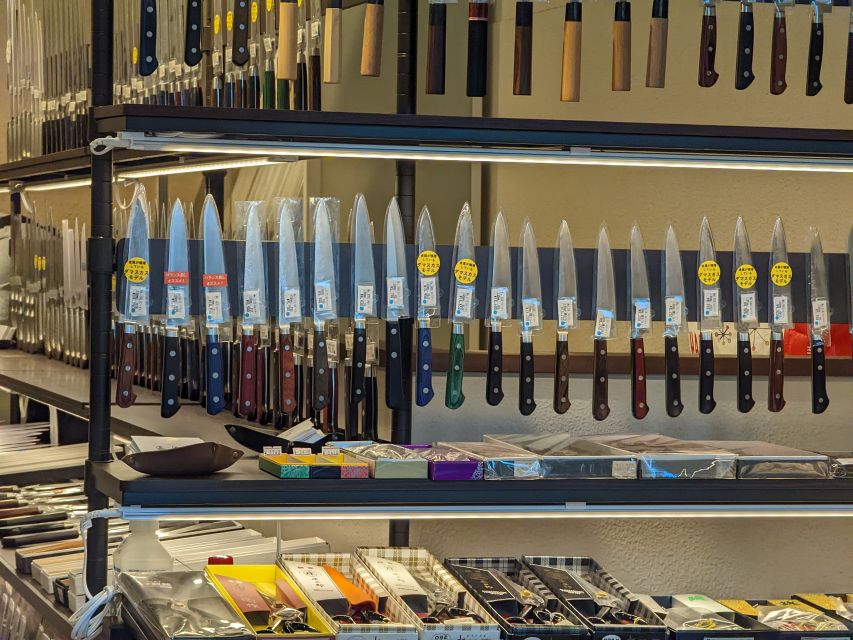
- Explore high-quality kitchen knives at Kappabashi Street post-history tour.
- Enhance culinary skills and delve into Japanese culinary traditions.
- Engage with knowledgeable store staff for insights on knife craftsmanship.
- Immerse in Asakusa culture through a blend of history, tradition, and culinary exploration.
Asakusa Tourist Information Center Details
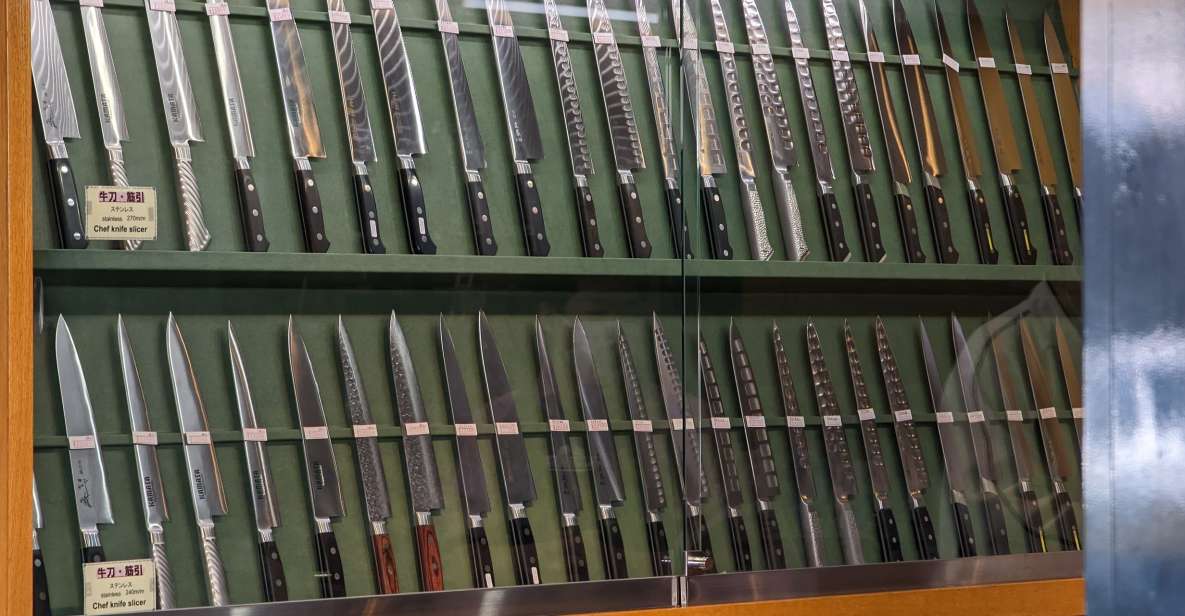
The Asakusa Tourist Information Center provides essential guidance and assistance for visitors exploring the vibrant district of Asakusa in Tokyo.
For those interested in knife store shopping and cultural immersion, the center offers valuable insights to enhance the overall experience.
Whether visitors seek expert advice on purchasing Japanese kitchen knives or wish to delve into the rich history of Asakusa, the Information Center serves as a convenient starting point.
By providing information on local attractions, including the renowned Kappabashi Street, visitors can engage in a deep cultural exploration while enjoying the district’s unique offerings.
For a budget-friendly and enriching visit to Asakusa, the Information Center proves to be a valuable resource for all types of travelers.
Kappabashi Street Knife Store Visit
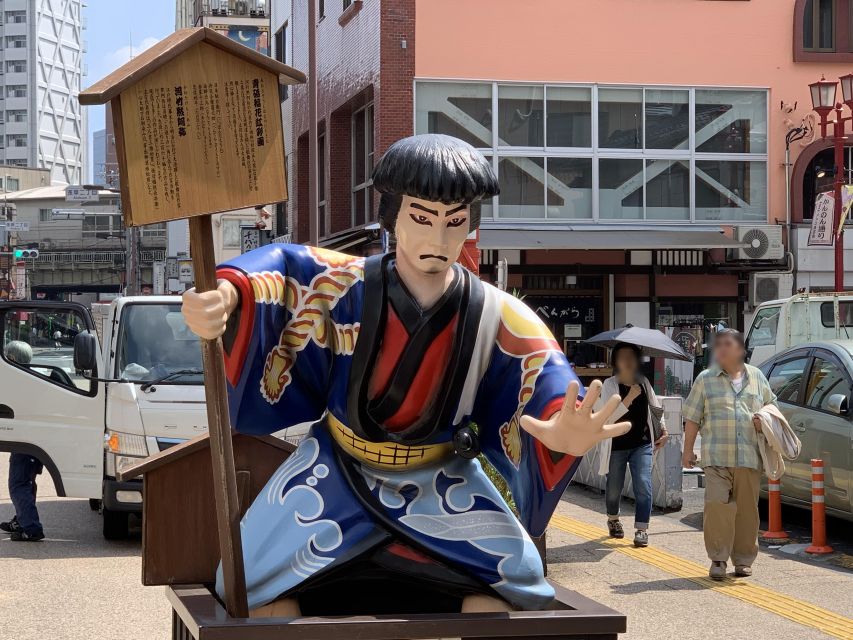
Exploring Kappabashi Street for kitchen knives promises an immersive and educational experience in Asakusa’s culinary world. This vibrant street is renowned for its numerous stores offering a wide range of high-quality kitchen knives, making it a haven for knife shopping enthusiasts. Visitors can engage in a unique culinary exploration by browsing through the diverse selection of knives while receiving expert guidance on choosing the perfect blade for their needs. The experience is not only about purchasing knives but also delving into the rich history and craftsmanship behind each blade. Kappabashi Street provides an excellent opportunity to gain insight into Japanese culinary traditions and acquire a practical and authentic souvenir to remember the trip by.
| Reasons to Visit Kappabashi Street for Knife Shopping | Benefits | Tips |
|---|---|---|
| Explore a variety of high-quality kitchen knives | Enhance your culinary skills | Engage with knowledgeable store staff |
Thunder Gate and Sensoji Temple
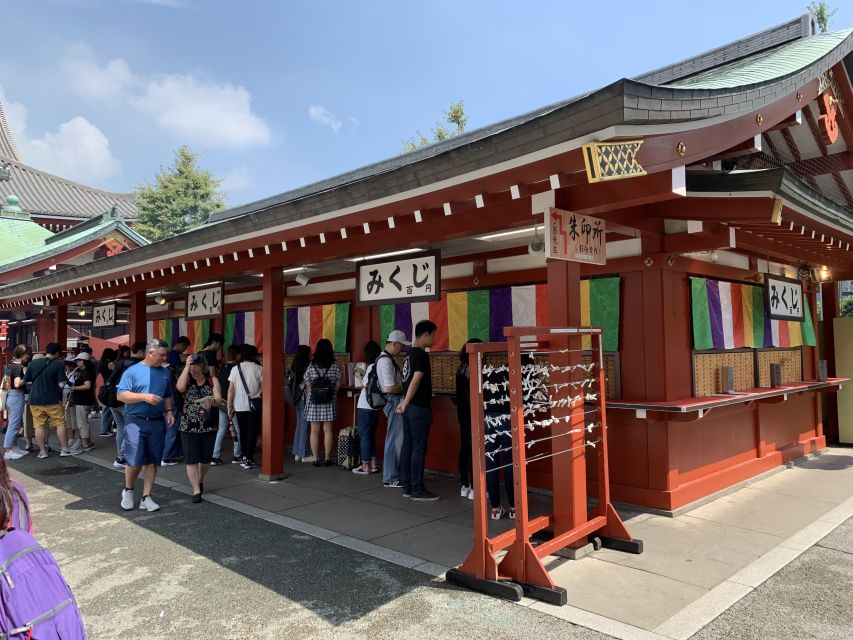
Visitors can now immerse themselves in the vibrant atmosphere of Thunder Gate and Sensoji Temple, soaking up the rich cultural heritage of Asakusa.
Thunder Gate, or Kaminarimon, is the outer gate leading to Sensoji Temple, adorned with a massive red lantern. As visitors pass through the gate, they enter Nakamise Shopping Street, lined with traditional shops selling snacks and souvenirs.
Continuing towards Sensoji Temple through Hōzōmon Gate, visitors can explore the temple grounds, filled with stunning architecture and religious artifacts.
This cultural exploration offers a glimpse into the spiritual heart of Asakusa, allowing visitors to appreciate the blend of history and tradition that defines this iconic area.
Japanese Sweet Snacks Experience
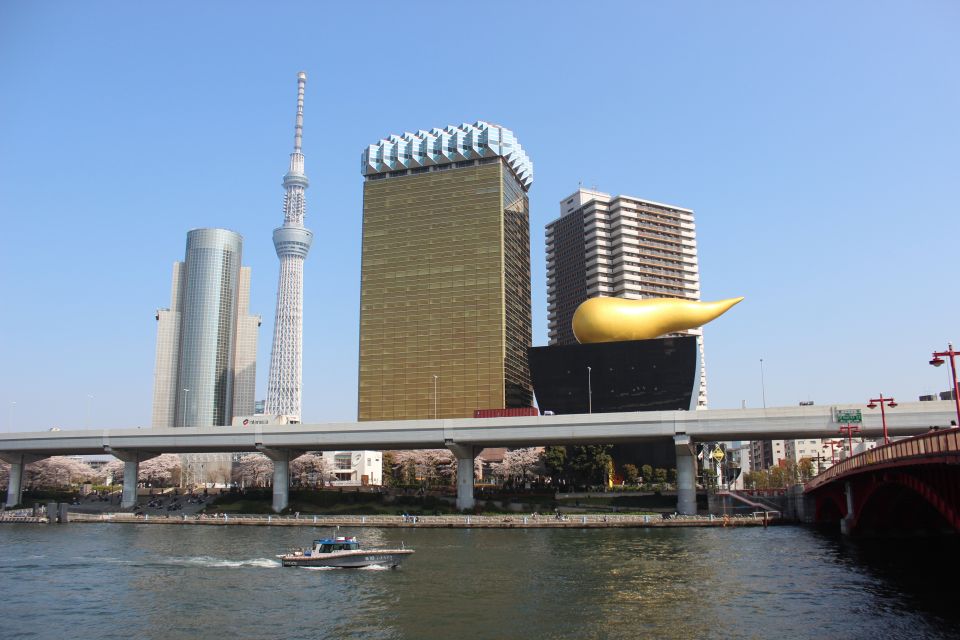
Indulge in a delightful array of Japanese sweet snacks during the Asakusa tour, adding a touch of sweetness to your cultural exploration.
- Try traditional Taiyaki, a fish-shaped cake filled with sweet red bean paste.
- Sample Dango, skewered rice dumplings topped with sweet soy sauce or red bean paste.
- Treat yourself to a Melon Pan, a sweet bun with a crispy cookie crust that pairs perfectly with a cup of matcha tea.
These sweet tasting treats offer a glimpse into Japanese culinary traditions, enhancing your cultural exploration of Asakusa.
Enjoy these budget-friendly snacks while immersing yourself in the vibrant atmosphere of this historic district.
Asakusa Tour History Insights
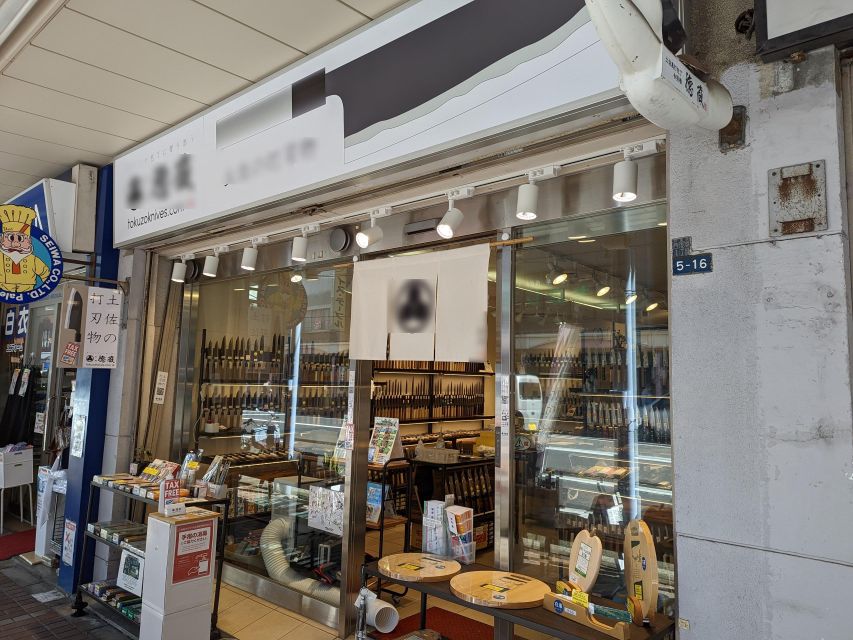
During the Asakusa tour, visitors gain valuable insights into the historical significance of this culturally rich district. The area is renowned for its deep-rooted Asakusa culture, offering a glimpse into traditional Japanese practices and craftsmanship. As part of the tour, guests have the opportunity to explore Kappabashi Street, known for its exquisite collection of Japanese kitchen knives. Here, they can witness firsthand the intricate artistry behind these culinary tools and learn about their importance in Japanese culinary traditions. Below is a table highlighting some key aspects of the historical and cultural significance of Asakusa and its renowned kitchen knives:
| Aspect | Description |
|---|---|
| Asakusa Culture | Offers insights into traditional Japanese practices and craftsmanship |
| Kitchen Knives | Explore the exquisite collection of Japanese kitchen knives |
| Historical Significance | Learn about the rich history and cultural heritage of Asakusa |
| Culinary Traditions | Understand the importance of kitchen knives in Japanese cuisine |
English-Speaking Guide Assistance
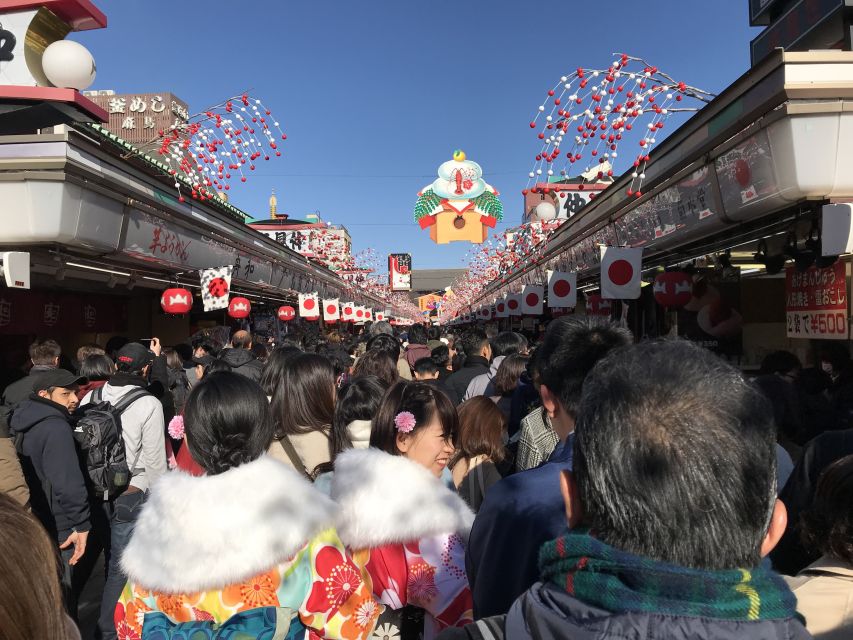
For enhanced exploration and seamless communication, an English-speaking guide is available to assist participants throughout the Asakusa tour.
-
Guide communication: The guide offers in-depth knowledge about Asakusa’s history and culture, enriching the tour experience.
-
Language support: Participants can comfortably ask questions and engage in conversations in English, ensuring clarity and understanding.
-
Assistance with local customs: The guide can help navigate any cultural differences and provide insights into traditional Japanese customs, enhancing the overall experience.
Customer Reviews and Testimonials
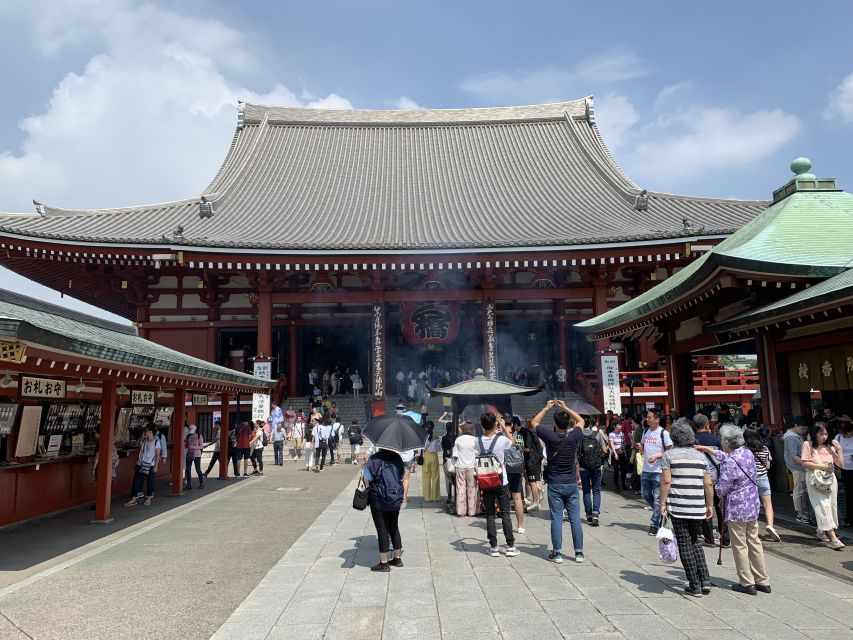
The tour’s exceptional customer reviews and testimonials showcase the high satisfaction levels among participants, reflecting the quality of the Asakusa experience offered. Visitors have praised the knowledgeable guide recommendations and appreciated the local cuisine suggestions provided during the tour. Here is a summary of some recent testimonials:
| Customer Reviews | Testimonials |
|---|---|
| Overall Rating: 5/5 | ‘If I could give six stars out of 5, I would. Our guide was phenomenal!’ – Justin, United States |
| Highlights of the Tour | ‘The guide’s local cuisine recommendations were spot on, enhancing our Asakusa visit.’ – Emily, Australia |
| Memorable Experience | ‘From start to finish, the tour exceeded our expectations. Highly recommended!’ – Alex, United Kingdom |
| Expert Guidance Provided | ‘The guide’s knowledge of the area and history truly enriched our experience in Asakusa.’ – Maria, Spain |
| Cultural Insights Shared | ‘We learned so much about Asakusa’s culture thanks to our guide. A fantastic tour!’ – Ken, Japan |
Frequently Asked Questions
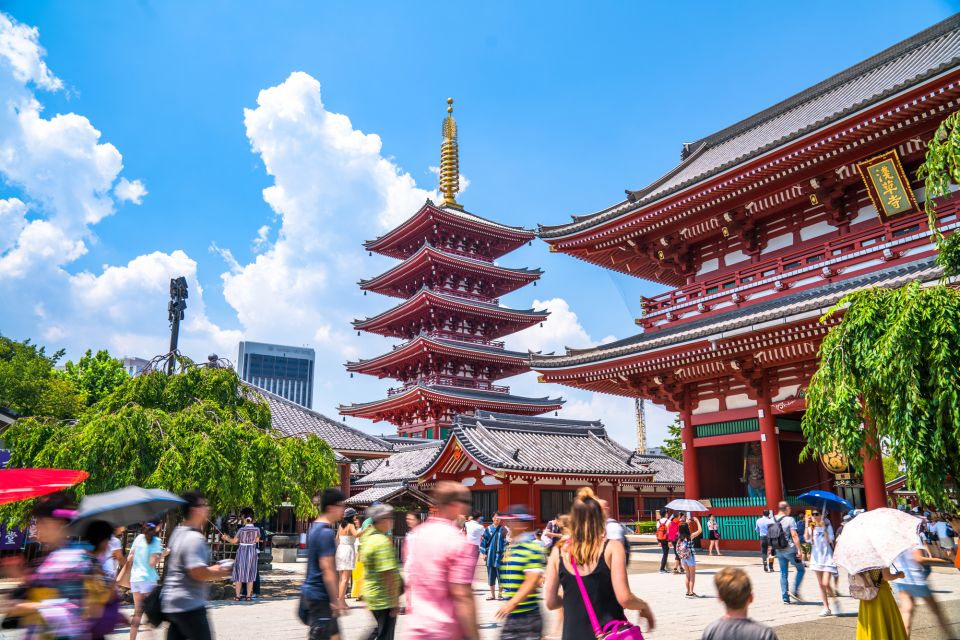
Are the Kitchen Knives at the Store in Kappabashi Street Handmade?
The kitchen knives at the store on Kappabashi Street showcase exquisite handmade craftsmanship. Customers can experience blade testing and appreciate the artistry behind these traditional Japanese blades. It’s a unique opportunity to witness skilled artisans at work.
Can Visitors Try Out the Kitchen Knives Before Making a Purchase?
Visitors can’t try out kitchen knives before purchase. However, knowledgeable staff can share information on knife sharpening and blade materials. The store’s selection, expert guidance, and historical context make it a valuable stop for knife enthusiasts.
Is There a Specific Time of Day When It’s Best to Visit Thunder Gate and Sensoji Temple?
The best time to visit Thunder Gate is early morning for a serene experience. For Sensoji Temple, a morning visit is recommended to avoid crowds and enjoy the peaceful ambiance. Start your day with tranquility.
Are the Japanese Sweet Snacks Included in the Tour Price, or Are They Available for Purchase Separately?
Japanese sweet snacks are included in the tour price, not available for separate purchase. The tour offers a taste of traditional crafts, enhancing the experience without additional costs. Participants can enjoy these treats as part of the immersive cultural journey.
How Far in Advance Should Visitors Book the Asakusa: Kitchen Knife Store Visits After History Tour to Secure a Spot?
To secure a spot on the Asakusa: Kitchen Knife Store Visits After History Tour, visitors should book in advance. Availability can change due to the limited group size of 8 participants and the popularity of the 3.5-hour tour.
Conclusion
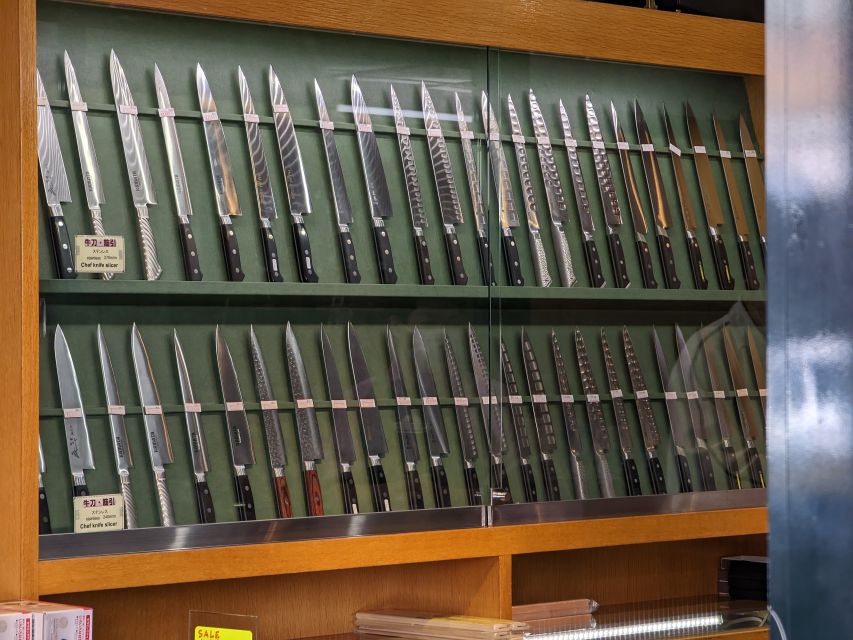
Discover the rich history and delectable culinary delights of Asakusa on this affordable and engaging tour. With a small group size and expert English-speaking guide, visitors can explore iconic landmarks like Kaminarimon Gate and Sensō-ji Temple before diving into the world of kitchen knives and Japanese sweets at Kappabashi Street.
Don’t miss out on this unforgettable journey through one of Tokyo’s most vibrant neighborhoods!
